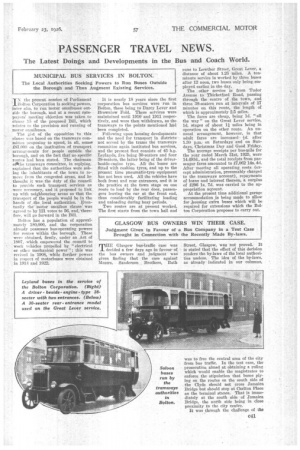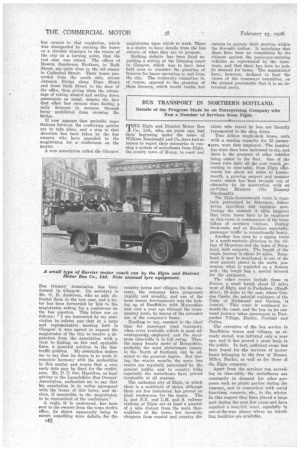GLASGOW BUS OWNERS WIN THEIR CASE.
Page 25

Page 26

If you've noticed an error in this article please click here to report it so we can fix it.
Judgment Given in Favour of a Bus Company in a Test Case Brought in Connection with the Recently Made By-laws.
TEM Glasgow bus-traffic ease was decided a few' days ago in favour-of. the bus owners and judgment• was given finding that the case against Messrs. Sanderson Brothers, Bath
Street, Glasgow, was not proved. It is stated that the effect of this decision renders the by-laws of the local authorities useless. The idea of the by-laws, as already indicated in our columns, was to free the central area of the city from bus traffic. In the test case, the prosecution aimed at obtaining a ruling which would enable the magistrates to enforce the stipulation that buses plying on the routes on the south side of the Clyde should not cross Jamaica Bridge but should stop at Carlton Place as the terminal stance. That is immediately at the south side of Jamaica Bridge, the north side being in close proximity to the city centre. It was through the challenge of the bus owners to that regulation, which was disregarded by running the buses on a circular itinerary in the centre of the city as a turning point, that the test case was raised. The offices of Messrs, Sanderson Brothers, in Bath Street, are quite close to the old stance in Cathedral Street. Their buses proceeded from the south side, across Jamaica Bridge along Hope Street and down Bath Street to the door of the office, thus giving them the advantage of taking aboard and setting down passengers as usual, despite the fact that other bus owners were finding a daily decrease in revenue through being prohibited from crossing the bridge.
It hOW appears that amicable negotiations between the conflicting parties are to take place, and a step in that direction has been taken by the bus owners, who have appealed to the magistrates for a conference on the matter.
A new association called the Glasgow
Bus Owners' Association has been formed in Glasgow. Its secretary is Mr. G. B. Anderson, who so ably defended them in the test case, and a letter has been forwarded by him to the magistrates asking for a conference on the bus question. This letter ran as follows: "I am instructed by my association to inform you that at a large and representative meeting held in Glasgow it was agreed to request the magistrates of the city to receive a deputation from the association with a view to finding, on fair and equitable lines, a' peaceful solution to the bustraffic problem. My association desires me to say that its desire is to work in complete harmony with the authorities in this matter and trusts that a very early date may be fixed for the conference. Mr. D. C. Orr, Hamilton, as legal adviser to the Lanarkshire Bus Owners' Association, authorizes me to say that his association is in entire agreement with the terms of this letter, and desires, if acceptable to the magistrates, to be represented at the conference."
A reply, it is undertood, has been sent to the owners from the town clerk's office, its object apparently being to secure something more definite for the magistrates upon which to work. There is a desire to have details from the bus owners of what they are to propose.
Nothing definite has been fixed regarding a sitting of the licensing court in Glasgow, which was to have been held soon to consider the granting of licences for buses • operating to and from the city. The tramways committee is, of course, opposed to the granting of these licence; which would enable bus owners to operate their services within the five-mile radius. It maintains that there have been no complaints by the citizens against the passenger-carrying vehicles as represented by the tramways, and that there hgs been no public demand for buses. The magistrates have, however, declined to heat the views of the tramways committee, on the ground presumably that it is an interested party.






























